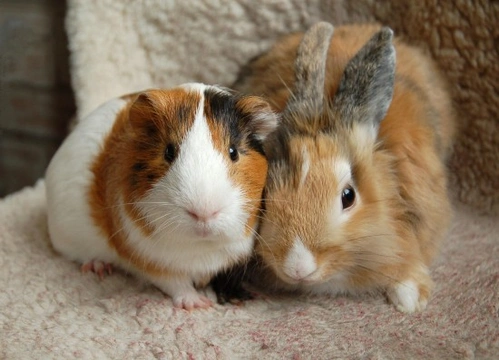
Rabbits or Guinea Pigs? Which Pet Is Best for You?
There's no denying that both rabbits and guinea pigs make wonderful pets and have done so for decades. The good news is we now understand much more about how to care for them, including their diet and the ideal environment needed for them to thrive.
If you are thinking about getting a family pet, either a rabbit or a guinea pig (also known as a cavy) might be an excellent choice. However, deciding which pet suits your family best depends on understanding their similarities and differences. Below is a detailed overview that can help guide your decision based on responsible pet ownership.
Understanding Similarities Between Rabbits and Guinea Pigs
Both rabbits and guinea pigs require spacious, clean, dry, and safe environments. Large cages or hutches are essential to prevent feelings of confinement, as these small animals dislike being kept in restricted spaces. Regular cleaning is critical to avoid the build-up of harmful bacteria and maintain their health.
Both prefer warm, draft-free environments. Placement of hutches in garden sheds or other sheltered areas is ideal, especially during extreme weather, providing protection from cold or damp conditions. Some guinea pig breeds need to be kept indoors as they do not tolerate cold well.
Diet-wise, both species are herbivores that continuously need to chew to maintain healthy teeth. High-quality fresh hay is a staple for both, supplying vital fibre for digestion and keeping their teeth trimmed. They should never be fed cooked food or diets rich in sugar or fat, which can lead to digestive and dental problems. Fresh vegetables and occasional fruits add dietary variety and can be given as treats in moderation.
Key Differences Between Rabbits and Guinea Pigs
Size and Lifespan: Rabbits tend to be bigger, with some breeds growing quite large, and typically live longer, often 8 to 12 years or more when well cared for. Guinea pigs are smaller and usually live between 5 to 8 years.
Sleep and Behaviour: Rabbits often sleep for longer, uninterrupted periods (around 8 hours), whereas guinea pigs prefer to take short naps throughout the day and night, occasionally with their eyes open as a natural defence.
Exercise and Habitat Needs: Rabbits are excellent jumpers and burrowers. Outdoor rabbit runs need secure wire roofs and bases to prevent escapes. Guinea pigs do not burrow or jump, so their runs don't require overhead or floor wire, though predator protection is still important.
Social and Handling Differences: Rabbits can be skittish and may nip if frightened; they require gentle, patient socialisation. Guinea pigs are often calmer, more docile, and easier for children to handle, although supervision is crucial to protect both pet and child.
Care Tips for Both Pets
Both rabbits and guinea pigs need daily access to fresh, clean water and a diet consisting mainly of good quality hay, supplemented with fresh vegetables. Their hutches or cages must be cleaned regularly, ideally daily spot cleaning with a thorough clean weekly, to prevent health issues.
Long-haired rabbits and guinea pigs require regular grooming—daily if possible—to prevent tangles and skin problems. Shorter-haired varieties also benefit from regular handling and grooming sessions, which provide valuable bonding time and health checks.
Both pets thrive on social interaction and are prone to loneliness. It is generally recommended to keep guinea pigs in pairs or groups, as they are highly social. Rabbits also benefit from companionship but require careful introduction to prevent fighting.
Friendliness and Compatibility with Children
With proper handling from a young age, both species can become affectionate, friendly pets. Children should always be supervised when interacting with rabbits or guinea pigs to ensure gentle handling and to protect the animals from injury.
Can Rabbits and Guinea Pigs Be Kept Together?
Although rabbits and guinea pigs were often kept together in the past, it is now advised against by experts. Rabbits may bully guinea pigs due to size and behavioural differences, causing stress and harm.
Making the Right Choice: Which Pet is Best for You?
Choose a Rabbit if:
- You have plenty of space and time to provide exercise and enrichment.
- You want a pet with a potentially longer lifespan (up to 10+ years).
- You enjoy socialising with an active, intelligent animal that can bond closely.
Choose a Guinea Pig if:
- Your living space is limited but you still want a social, gentle pet.
- You have young children who need a calmer animal less prone to biting or scratching.
- You prefer a pet with less intensive exercise needs and a shorter lifespan commitment (5–8 years).
Additional Advice for Prospective Owners
No matter which pet you choose, responsible ownership includes providing a balanced diet, daily care, social interaction, and regular veterinary health checks. Acquiring pets from reputable sources or find guinea pig pups from trusted breeders or rabbits for sale is essential to ensure healthy, well-socialised animals. Always avoid impulsive purchases and thoroughly research care requirements before bringing a pet home.
Conclusion
Both rabbits and guinea pigs make rewarding family pets when cared for thoughtfully. Understanding their specific needs promotes healthy, happy pets and positive owner experiences. Whether you choose a lively rabbit or a calm guinea pig, these small animals enrich lives with their charm and companionship.



